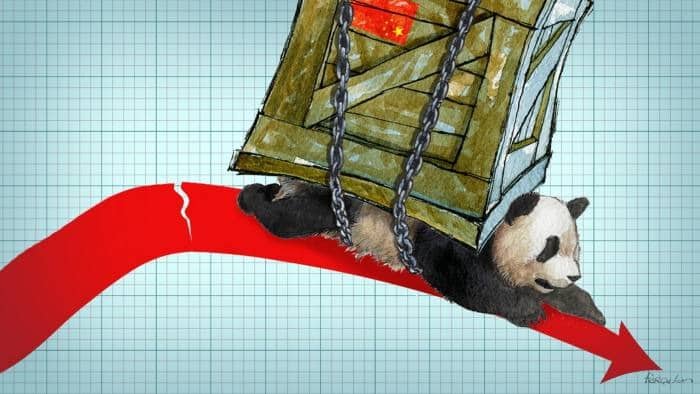The other G20 countries should signal consensus against Beijing running a big surplus
The G20 is supposed to be the premier forum for management of the global economy and the biggest economic issue in the world right now is a chronic lack of demand in China.
It is therefore more than unfortunate that president Xi Jinping has decided not to attend the summit in New Delhi this weekend, sending premier Li Qiang instead, and highlighting in the process just how few options other countries will have if China tries to solve its economic challenges by falling back on demand from the rest of the world. Since Xi will not be there to address it, the other world leaders should consider in his absence exactly how they would handle this scenario.
As Brad Setser of the Council on Foreign Relations points out, economic weakness in China has little direct effect on other advanced economies, because China makes so much for itself and buys so little from anybody else. Only a tiny fraction of US output reflects the manufacture of goods and their export to the world’s other economic giant.
Rather than causing a slowdown elsewhere, the issue is what would happen if China tried to export its way to growth as it did in the 1990s and 2000s. China’s current account surplus already runs at 2 per cent of its enormous economy. If Beijing sought to increase that it would be problematic, but most especially if it did so via policies aimed at holding down the value of the renminbi exchange rate.
The benefit of such policies to China is questionable these days. With its economy now so big, and its manufacturing trade surplus already so large, it is hard to imagine how foreign demand can make a big enough contribution to offset the faltering housing market.
A focus on exports, however, fits with Xi’s goal of building Chinese strength in high-technology industry and his distaste for a stimulus aimed at domestic consumption. Encouragement for Chinese citizens to travel at home, rather than go abroad, is one example of how policy can divert demand away from other nations.
Even if the diversion of demand to China was not enough to generate strong growth at home, it could still cause disruption to the world economy. Most obviously, if China makes its goods more competitive, they will displace production elsewhere.
More subtly, a current account surplus must be offset by capital flows. The recycling of China’s surplus contributed to easy financial conditions around the world prior to the 2007-08 financial crash, just as the export of German savings to countries such as Greece was part of the build-up to the eurozone crisis in 2011. Such imbalances in the global economy are not a phenomenon anybody should be in a hurry to revisit.
What then can the rest of the G20 do about it, other than urge China to generate more demand of its own? There are few easy answers.
One thing to note is that a growing Chinese surplus would have superficial attractions. The economic environment of the mid-2000s was popular: it let western consumers live beyond their means, even if it sped the decline of their manufacturing industries. Right now, a deflationary impetus from China would help to address the rise in the cost of living. This would palliate a source of pain for many western politicians.
However, there should now be more international consensus against China running a big surplus than there was 20 years ago. China’s economy is much larger and richer than it was then. Japan and Germany, which have long prospered from exports of luxury cars and capital equipment to China, now confront its rapid emergence as an automobile exporter. The rest of Asia competes with China in export markets so most nations, excepting pure commodity exporters, have something at stake.
If the US had not retreated from economic co-operation itself, as it did in abandoning the Trans-Pacific Partnership trade deal, it would have more standing to make these points. With American diplomacy now concentrated so heavily on military and security competition with Beijing, any objections it makes to Chinese economic policy will be regarded with suspicion by many other countries.
That leaves the question of tools. One big achievement of the G20 is its agreement to avoid currency devaluation for competitive purposes and maintaining that consensus in New Delhi is vital. There is no enforcement mechanism, however, even against outright currency manipulation, let alone more nuanced policies that drive up a current account surplus but are difficult to detect, let alone dispute.
This is a fundamental flaw in the global economic system that dates back to its creation at Bretton Woods after the second world war: countries that run a persistent current account deficit will eventually be forced to adjust via a currency crisis, but there is no mechanism to discipline countries that run a persistent surplus. Yet the surplus of one country must be the deficit of another.
Deep reform and collaborative management of the world economy would require the US and China to work together — something that seems today more distant than ever. What world leaders can do at the G20 is signal — to everybody, not just China — their objection to policies that seek to stabilise domestic economies on the back of demand from others.
Source: Financial Times



